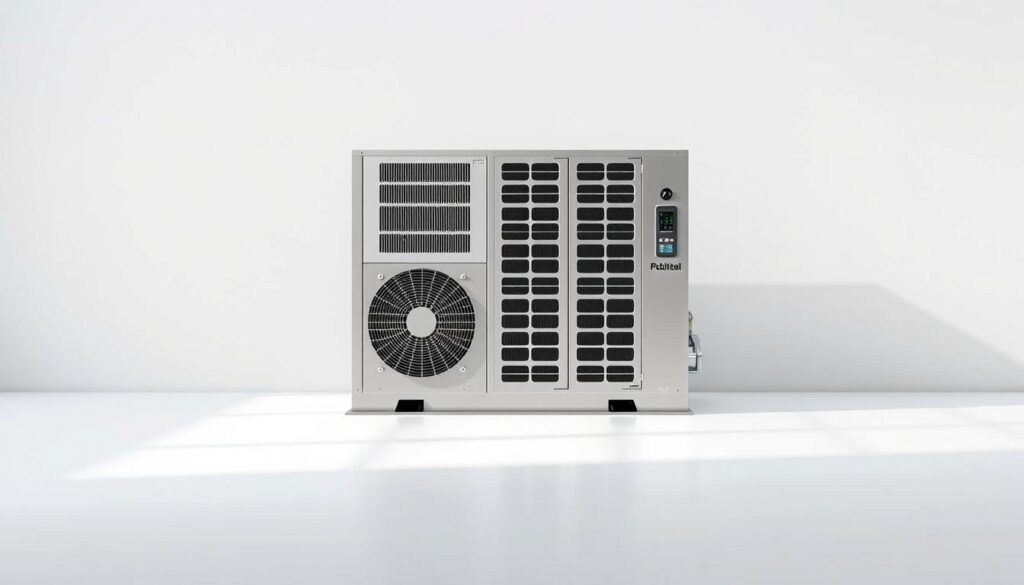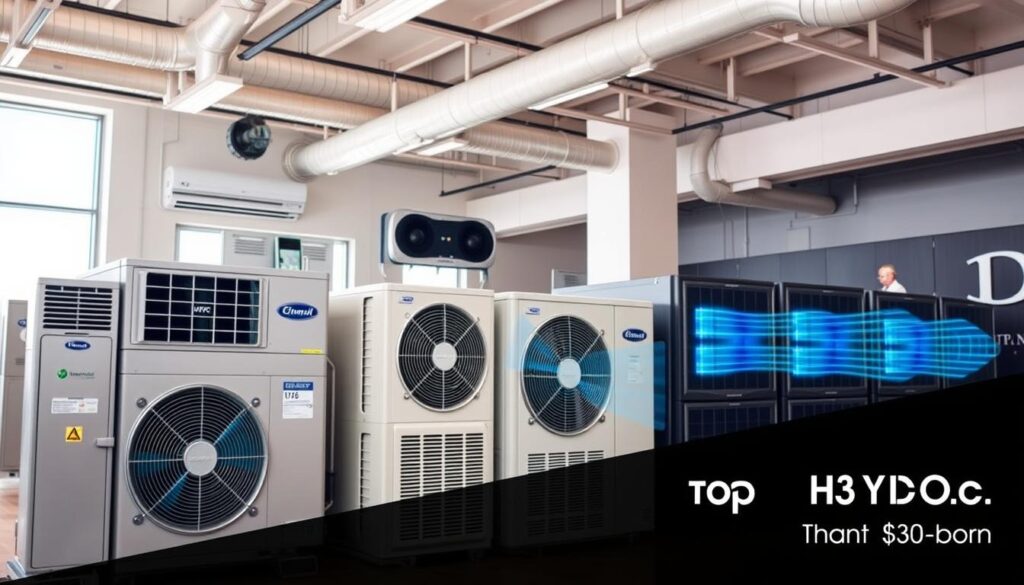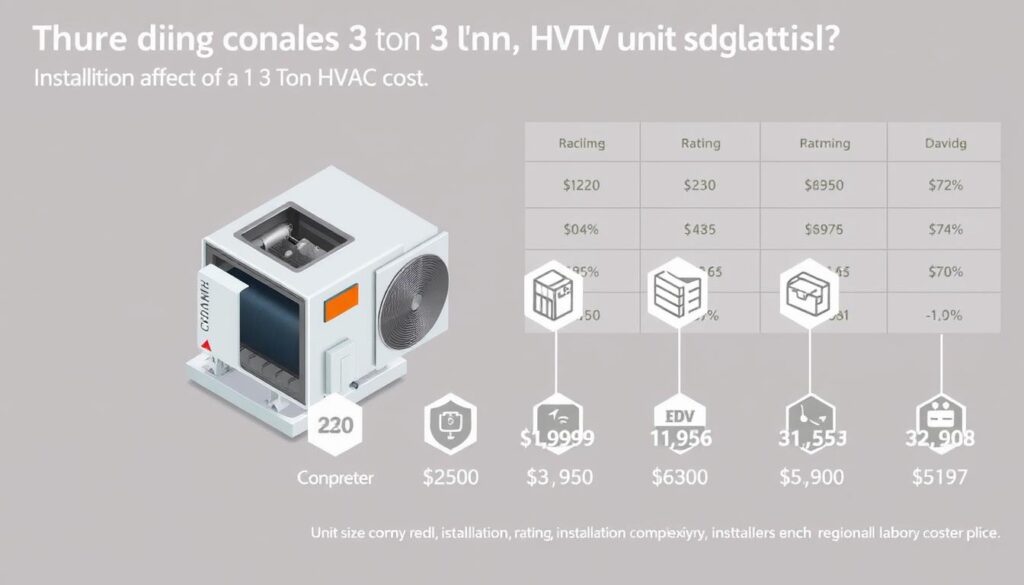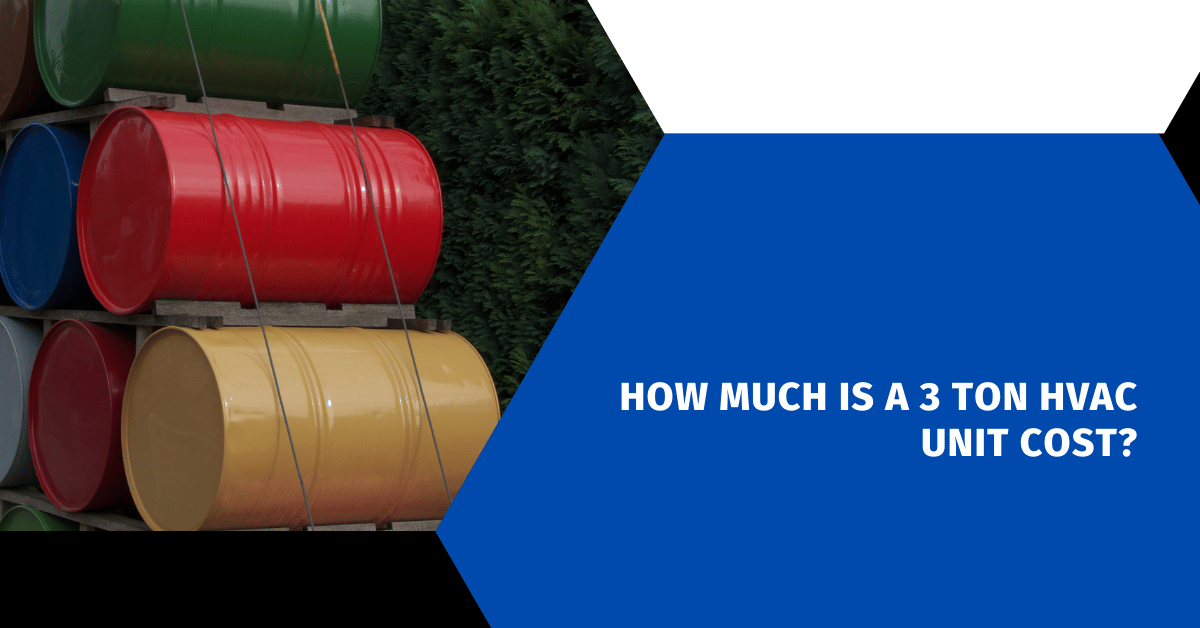Affiliate Disclosure
HVAC Guide Guys is a participant in the Amazon Services LLC Associates Program, an affiliate advertising program designed to provide a means for sites to earn advertising fees by advertising and linking to Amazon.
How Much is a 3 Ton HVAC Unit Cost? Are you curious about the cost of a 3 ton HVAC unit? Knowing the price can help homeowners plan their cooling system upgrades. The cost of a 3 ton HVAC unit is more than just a number. It depends on several factors that can change your budget a lot.

Prices for a 3 ton HVAC unit vary a lot. They usually cost between $5,534 and $19,051. This price range depends on your needs and the system’s requirements. Things like the system type, efficiency, and how hard it is to install also play a part.
This guide will help you understand 3 ton HVAC unit prices. It will give you the information you need to choose a system that’s both effective and affordable.
Key Takeaways
- Average 3 ton HVAC unit cost ranges from $5,534 to $19,051
- Prices vary based on system type and efficiency ratings
- Installation costs can significantly impact total expenses
- Energy efficiency plays a key role in saving money in the long run
- Getting a professional assessment is a good idea for accurate pricing
Table of Contents
Understanding 3 Ton HVAC System Basics
Choosing the right HVAC system is key. It involves knowing about ac unit sizing and cooling capacity. A 3-ton HVAC unit is a good choice for many homeowners. It helps control the temperature efficiently.
What is a 3 Ton HVAC Unit?
A 3-ton HVAC unit isn’t heavy. It’s measured by its cooling power. It can remove 36,000 BTUs of heat per hour. This makes your home cool during hot months.
Cooling Capacity and Home Size Requirements
When picking an ac unit, square footage matters. A 3-ton unit fits homes of 1,600 to 1,900 square feet. Several things affect this:
- Home insulation quality
- Number of windows
- Ceiling height
- Local climate conditions
Common Applications for 3 Ton Systems
These systems are popular in:
- Single-family homes
- Medium-sized apartments
- Townhouses
- Smaller commercial spaces
Pro tip: Always consult a professional HVAC technician to determine the exact unit size for your specific space.
Explore Our HVAC Shop
Looking for top-rated HVAC tools, parts, and accessories? Visit our shop and find the perfect solution for your needs.
Visit the ShopAverage Cost Range for 3 Ton HVAC Systems
When looking at a new 3 ton AC unit, knowing the price range is key. Homeowners need to plan their HVAC investment wisely. Central air conditioner prices for a 3 ton system usually range from $4,000 to $7,500. This depends on several important factors.
Your total 3 ton ac unit price will change based on several things:
- System brand and manufacturer reputation
- Energy efficiency ratings (SEER)
- Installation complexity
- Regional market conditions
- Additional system features
Homeowners on a budget should remember that upfront costs are important. But, long-term energy savings can make up for the initial cost. A more efficient system might cost more at first. But, it could lower your monthly utility bills a lot.
Here’s a breakdown of typical central air conditioner prices for 3 ton systems:
- Entry-level systems: $4,000 – $5,500
- Mid-range systems: $5,500 – $6,500
- Premium systems: $6,500 – $7,500+
Choosing a quality 3 ton HVAC system needs careful thought. You must consider your home’s needs, your budget, and your comfort goals for the long run.
How Much is a 3 Ton HVAC Unit by System Type
Exploring home cooling systems can be complex. Knowing the costs of different HVAC systems helps you choose wisely. Each system has its own benefits and prices, fitting various cooling needs.
Choosing the right HVAC system depends on several factors. These include your local climate, home size, and budget. Let’s look at the most common 3-ton HVAC systems and their costs.
AC & Electric Furnace Combinations
An AC and electric furnace combo offers reliable cooling and heating. These systems usually cost about $7,530. They have several benefits:
- Lower upfront installation costs
- Suitable for moderate climates
- Simple maintenance requirements
Heat Pump Systems
Heat pump systems are efficient and cost-effective, with an average price of $8,380. They work well in mild winter areas and provide both heating and cooling.
- Energy-efficient operation
- Lower long-term operating expenses
- Environmentally friendly technology
Dual Fuel Systems
Dual fuel systems offer flexibility, averaging $11,084. They combine a heat pump with a gas furnace for top performance.
“Dual fuel systems provide the best of both worlds, adapting to temperature extremes with remarkable efficiency.” – HVAC Professional
- Adaptable to extreme temperature variations
- Enhanced energy savings
- Optimal comfort in diverse climates
Explore Our HVAC Shop
Looking for top-rated HVAC tools, parts, and accessories? Visit our shop and find the perfect solution for your needs.
Visit the ShopSEER2 Ratings and Their Impact on Price
SEER2 ratings are key when looking at energy efficient ac units. They show how well your HVAC system cools, affecting both the cost and your energy bills over time.
SEER2 ratings go from 13.4 to 16.1+, with higher numbers meaning better energy use. Choosing a unit with a higher rating might cost more upfront. But, it can save you a lot of money in the long run.
- Lower SEER2 ratings (13.4-14.5): Most affordable initial cost
- Mid-range SEER2 ratings (14.6-15.5): Balanced efficiency and price
- High SEER2 ratings (15.6-16.1+): Maximum energy savings
Local rules can change, so always check what’s needed in your area. Some places require a certain SEER2 rating to save energy.
“Investing in a high-efficiency HVAC system pays dividends through reduced energy consumption and lower utility bills.” – Energy Star Recommendation
| SEER2 Rating | Average Unit Cost | Estimated Annual Savings |
|---|---|---|
| 13.4-14.5 | $2,500-$3,500 | $50-$100 |
| 14.6-15.5 | $3,500-$4,500 | $100-$200 |
| 15.6-16.1+ | $4,500-$6,000 | $200-$350 |
Even though high-efficiency ac units cost more at first, they save you money in the long run. This can lead to big savings on your HVAC system costs.
Installation Costs and Considerations
When planning your air conditioning installation, it’s important to know the total cost. It’s not just about the price of the equipment. The installation process has several key parts that affect your overall cost.
Professional air conditioning installation costs between $750 and $1,500. This price varies based on several important factors.
Breaking Down Labor Expenses
Labor costs are a big part of the total cost. Technicians charge differently based on:
- Where you live
- How complex the installation is
- The type and setup of the system
- Local rates
Essential Installation Materials
You’ll also need to budget for extra materials for a proper installation:
- Refrigerant lines
- Electrical wiring
- Mounting brackets
- Ductwork changes
- Insulation materials
Permit Requirements
Most places need permits for hvac unit installations. These permits cost between $250 and $500. They make sure your installation follows local codes. Always check with your local government about specific needs.
Pro tip: Always get multiple quotes and verify contractor licensing to ensure a smooth and cost-effective air conditioning installation.
Explore Our HVAC Shop
Looking for top-rated HVAC tools, parts, and accessories? Visit our shop and find the perfect solution for your needs.
Visit the ShopBrand Comparison and Price Differences

Shopping for residential HVAC systems? Knowing the differences between brands is key to a smart buy. Prices for central air conditioners vary a lot, with top brands costing more.
Top brands in the market offer unique features and pricing:
- Carrier: Known for reliability and advanced technology
- Trane: Emphasizes durability and high-performance units
- Lennox: Focuses on energy-efficient solutions
- Goodman: Provides budget-friendly options
Prices between brands can differ by 20% to 30%. This depends on the technology and reputation. Your home’s needs will help pick the best option.
| Brand | Price Range | Key Features |
|---|---|---|
| Carrier | $4,500 – $7,200 | Innovative comfort control |
| Trane | $4,800 – $7,500 | Robust construction |
| Lennox | $5,000 – $8,000 | High energy efficiency |
| Goodman | $3,500 – $5,500 | Affordable performance |
Don’t just look at the initial cost of central air conditioners. Think about long-term efficiency, warranty, and performance. This will help you get the most value for your money.
Energy Efficiency and Operating Costs
Choosing energy efficient ac units can greatly improve your home’s cooling systems. It also cuts down on long-term costs. Modern HVAC tech lets you save energy while keeping your home comfy.
Knowing how efficient your cooling system is helps you make better money choices. High-performance units can cut your monthly bills by a lot. This leads to big savings over time.
Monthly Energy Consumption Analysis
Your cooling system’s energy use depends on a few key things:
- SEER rating of the unit
- Home insulation quality
- Local climate conditions
- Daily usage patterns
Energy efficient ac units can use 20-30% less electricity than standard ones. This means big savings all year long.
Long-Term Cost Benefits
| Efficiency Level | Annual Energy Savings | Estimated Cost Reduction |
|---|---|---|
| Standard Efficiency | Baseline | $0 |
| High Efficiency | 20-30% | $300-$500 |
| Premium Efficiency | 30-40% | $500-$750 |
Choosing an energy-efficient HVAC system has many benefits. You’ll see lower bills, less environmental harm, and more comfort at home. Investing in efficient cooling tech brings long-term rewards.
Explore Our HVAC Shop
Looking for top-rated HVAC tools, parts, and accessories? Visit our shop and find the perfect solution for your needs.
Visit the ShopFactors Affecting Total HVAC System Cost

When planning your HVAC unit cost, many variables can change the total price. Knowing these factors helps you choose the right ac unit size and system cost.
Your home’s unique features greatly affect HVAC system prices. Important factors include:
- Home square footage and layout complexity
- Existing ductwork condition
- Local climate requirements
- Electrical system compatibility
Home size is a big factor in ac unit sizing. Bigger homes need stronger systems, which cost more. Older homes might need extra work, which can increase installation costs.
Climate in your area also matters a lot. Places with very hot or cold temperatures need more efficient systems. These systems cost more at first but save money on energy in the long run.
Local market prices also change HVAC costs. Things like labor rates, competition, and supply chains can make prices different in different places.
Understanding these factors can help you choose a cost-effective HVAC system.
Getting a professional’s opinion is key. A certified HVAC technician can give you advice that fits your home perfectly. This ensures your system works well and efficiently.
Regional Price Variations and Market Trends
When looking at hvac equipment costs, you’ll see big price differences across the United States. Where you live greatly affects how much your HVAC system will cost.
Knowing these regional price changes helps you plan your HVAC budget better. Several things affect the cost, including:
- Local climate conditions
- Cost of living in the area
- Regional labor rates
- Local building regulations
Geographic Cost Differences
Hvac equipment costs can change by up to 20% between states and cities. Southern and Southwestern states usually have higher costs because of the heat. Northern areas might have lower prices for similar systems.
| Region | Average Installation Cost | Key Factors |
|---|---|---|
| Southwest | $6,500 – $8,500 | High heat, complex systems |
| Northeast | $5,000 – $7,000 | Moderate climate, fewer cooling days |
| Midwest | $5,500 – $7,500 | Variable climate, balanced needs |
Seasonal Price Fluctuations
Smart homeowners can save money by knowing when to buy HVAC systems. Off-peak seasons usually have better prices. Winter and early spring are the best times for deals on HVAC systems.
Choosing the right time to buy can save you 10-15% compared to summer. This can lead to big savings on your HVAC costs.
Explore Our HVAC Shop
Looking for top-rated HVAC tools, parts, and accessories? Visit our shop and find the perfect solution for your needs.
Visit the ShopWarranty and Maintenance Considerations
Keeping your HVAC system in top shape is key. Knowing about hvac equipment costs helps you protect your home’s comfort. It’s all about warranty coverage and regular maintenance.
There are two main types of HVAC warranties:
- Manufacturer’s Standard Warranty
- Extended Warranty Plans
Standard warranties cover important parts for 5-10 years. Extended warranties offer more protection, costing $200 to $600. They often include:
- Compressor replacement
- Major mechanical component repairs
- Some labor costs
Regular maintenance is vital for your HVAC system’s longevity and efficiency. Annual maintenance plans cost $150 to $300. They include:
- Comprehensive system inspection
- Cleaning of critical components
- Performance optimization
| Maintenance Type | Average Cost | Frequency |
|---|---|---|
| Basic Tune-up | $75-$200 | Annual |
| Comprehensive Maintenance Plan | $150-$300 | Annual |
| Extended Warranty | $200-$600 | One-time purchase |
Proper maintenance can save you money in the long run. It prevents costly repairs and extends your system’s life. Regular checks keep your system running efficiently, which can lower your utility bills.
Conclusion
Choosing the right 3-ton HVAC unit is more than just knowing the cost. It’s a big investment that affects your comfort and energy bills. By doing your homework and planning carefully, you can make a choice that’s both smart and cost-effective.
When looking at home cooling systems, don’t just focus on the price. Look at energy efficiency, installation quality, and maintenance needs too. A good HVAC contractor can give you advice that fits your home’s unique needs.
Your budget and what you need for your home should guide your choice. Get quotes from certified HVAC pros to see your options. Remember, the cheapest option might not be the best value over time. Choose systems with strong warranties, reliability, and energy-saving features.
In the end, a well-chosen 3-ton HVAC unit can bring comfort to your home for years. Take your time to research, ask questions, and work with trusted professionals. They can help you find the best cooling solution for your home.
FAQ
What does a 3-ton HVAC unit mean?
How much does a 3-ton HVAC unit cost?
What factors affect the price of a 3-ton HVAC system?
How do SEER2 ratings impact HVAC unit pricing?
What are the most cost-effective HVAC system types for a 3-ton unit?
How much does HVAC installation cost?
What does a 3-ton HVAC unit mean?
How much does a 3-ton HVAC unit cost?
What factors affect the price of a 3-ton HVAC system?
How do SEER2 ratings impact HVAC unit pricing?
What are the most cost-effective HVAC system types for a 3-ton unit?
How much does HVAC installation cost?
FAQ
What does a 3-ton HVAC unit mean?
A 3-ton HVAC unit can cool 36,000 BTUs of heat per hour. It’s good for homes between 1,500 to 1,800 square feet. This depends on ceiling height, insulation, and local climate.
How much does a 3-ton HVAC unit cost?
A 3-ton HVAC unit costs between ,500 to ,500. Prices vary by brand, efficiency, type, and installation. High-efficiency units can cost up to ,000.
What factors affect the price of a 3-ton HVAC system?
Several factors affect price. These include SEER2 rating, brand, system type, and features. Installation complexity, location, and market also play a role.
How do SEER2 ratings impact HVAC unit pricing?
Higher SEER2 ratings mean higher costs upfront but lower energy bills. A unit with a SEER2 rating of 16 or above might cost 20-30% more. But, it can save you money on energy bills over time.
What are the most cost-effective HVAC system types for a 3-ton unit?
Split systems are often the most affordable, costing ,500 to ,500. Heat pumps offer both heating and cooling and can be more efficient. Dual-fuel systems are flexible but more expensive upfront.
How much does HVAC installation cost?
Installation costs range from
FAQ
What does a 3-ton HVAC unit mean?
A 3-ton HVAC unit can cool 36,000 BTUs of heat per hour. It’s good for homes between 1,500 to 1,800 square feet. This depends on ceiling height, insulation, and local climate.
How much does a 3-ton HVAC unit cost?
A 3-ton HVAC unit costs between $3,500 to $7,500. Prices vary by brand, efficiency, type, and installation. High-efficiency units can cost up to $10,000.
What factors affect the price of a 3-ton HVAC system?
Several factors affect price. These include SEER2 rating, brand, system type, and features. Installation complexity, location, and market also play a role.
How do SEER2 ratings impact HVAC unit pricing?
Higher SEER2 ratings mean higher costs upfront but lower energy bills. A unit with a SEER2 rating of 16 or above might cost 20-30% more. But, it can save you money on energy bills over time.
What are the most cost-effective HVAC system types for a 3-ton unit?
Split systems are often the most affordable, costing $3,500 to $7,500. Heat pumps offer both heating and cooling and can be more efficient. Dual-fuel systems are flexible but more expensive upfront.
How much does HVAC installation cost?
Installation costs range from $1,500 to $3,500. This depends on local rates, complexity, ductwork, and permits. Additional materials and upgrades can increase costs.
Which HVAC brands offer the best value for 3-ton units?
Brands like Carrier, Trane, and Lennox offer high-quality units but at a higher price. Goodman and Rheem provide more affordable options without sacrificing quality.
How can I reduce my HVAC system’s operating costs?
To lower costs, choose a high-efficiency unit with a good SEER2 rating. Ensure proper installation and regular maintenance. Use a programmable or smart thermostat and improve insulation.
Are extended warranties worth the investment?
Extended warranties cost $300-$700 and offer extra protection. They’re worth considering based on your system’s reliability, repair costs, and personal risk tolerance.
How often should I replace my 3-ton HVAC unit?
Most HVAC systems last 10-15 years with proper care. Usage, maintenance, climate, and technology advancements can affect when to replace it.
,500 to ,500. This depends on local rates, complexity, ductwork, and permits. Additional materials and upgrades can increase costs.
Which HVAC brands offer the best value for 3-ton units?
Brands like Carrier, Trane, and Lennox offer high-quality units but at a higher price. Goodman and Rheem provide more affordable options without sacrificing quality.
How can I reduce my HVAC system’s operating costs?
To lower costs, choose a high-efficiency unit with a good SEER2 rating. Ensure proper installation and regular maintenance. Use a programmable or smart thermostat and improve insulation.
Are extended warranties worth the investment?
Extended warranties cost 0-0 and offer extra protection. They’re worth considering based on your system’s reliability, repair costs, and personal risk tolerance.
How often should I replace my 3-ton HVAC unit?
Most HVAC systems last 10-15 years with proper care. Usage, maintenance, climate, and technology advancements can affect when to replace it.

